
llama_index
LlamaIndex is the leading framework for building LLM-powered agents over your data.
Stars: 47065
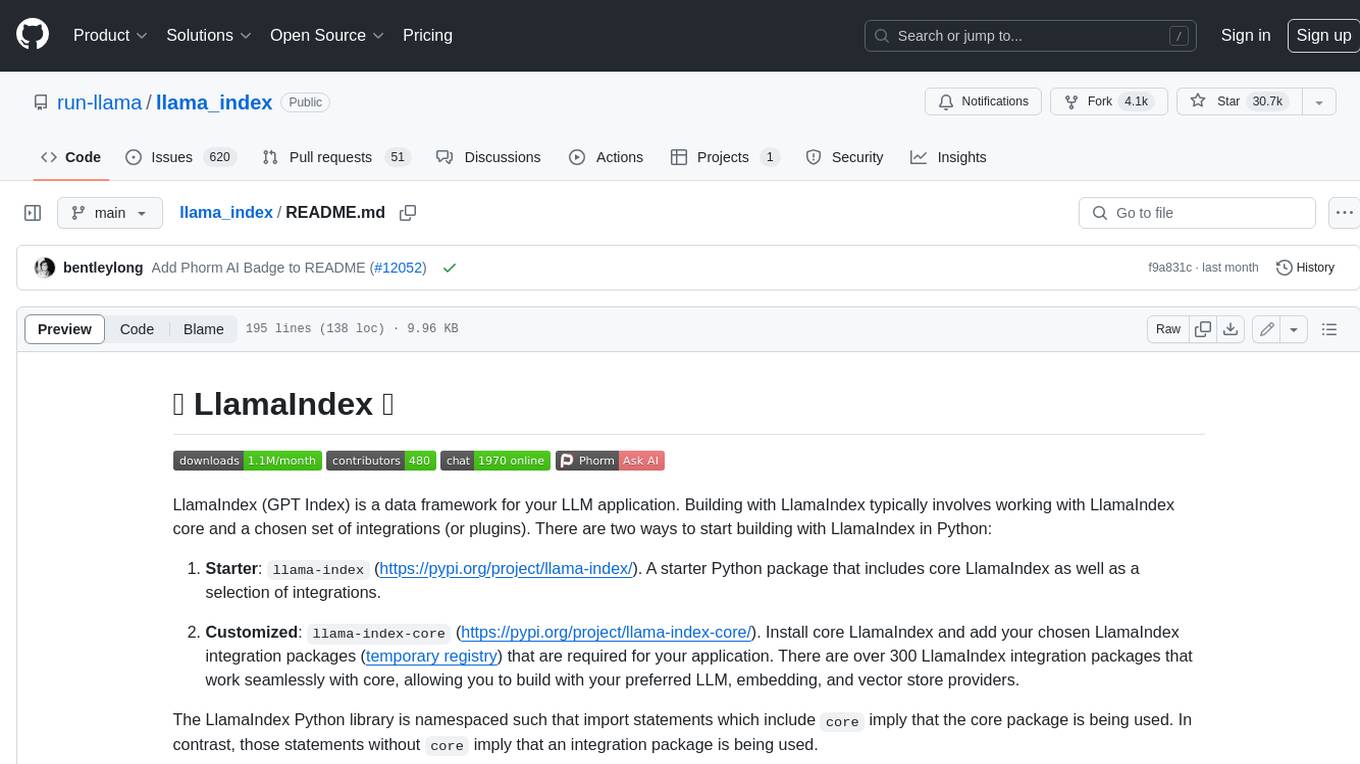
LlamaIndex is a data framework for building LLM applications. It provides tools for ingesting, structuring, and querying data, as well as integrating with LLMs and other tools. LlamaIndex is designed to be easy to use for both beginner and advanced users, and it provides a comprehensive set of features for building LLM applications.
README:
LlamaIndex (GPT Index) is a data framework for your LLM application. Building with LlamaIndex typically involves working with LlamaIndex core and a chosen set of integrations (or plugins). There are two ways to start building with LlamaIndex in Python:
-
Starter:
llama-index. A starter Python package that includes core LlamaIndex as well as a selection of integrations. -
Customized:
llama-index-core. Install core LlamaIndex and add your chosen LlamaIndex integration packages on LlamaHub that are required for your application. There are over 300 LlamaIndex integration packages that work seamlessly with core, allowing you to build with your preferred LLM, embedding, and vector store providers.
The LlamaIndex Python library is namespaced such that import statements which
include core imply that the core package is being used. In contrast, those
statements without core imply that an integration package is being used.
# typical pattern
from llama_index.core.xxx import ClassABC # core submodule xxx
from llama_index.xxx.yyy import (
SubclassABC,
) # integration yyy for submodule xxx
# concrete example
from llama_index.core.llms import LLM
from llama_index.llms.openai import OpenAILlamaIndex.TS (Typescript/Javascript)
NOTE: This README is not updated as frequently as the documentation. Please check out the documentation above for the latest updates!
- LLMs are a phenomenal piece of technology for knowledge generation and reasoning. They are pre-trained on large amounts of publicly available data.
- How do we best augment LLMs with our own private data?
We need a comprehensive toolkit to help perform this data augmentation for LLMs.
That's where LlamaIndex comes in. LlamaIndex is a "data framework" to help you build LLM apps. It provides the following tools:
- Offers data connectors to ingest your existing data sources and data formats (APIs, PDFs, docs, SQL, etc.).
- Provides ways to structure your data (indices, graphs) so that this data can be easily used with LLMs.
- Provides an advanced retrieval/query interface over your data: Feed in any LLM input prompt, get back retrieved context and knowledge-augmented output.
- Allows easy integrations with your outer application framework (e.g. with LangChain, Flask, Docker, ChatGPT, or anything else).
LlamaIndex provides tools for both beginner users and advanced users. Our high-level API allows beginner users to use LlamaIndex to ingest and query their data in 5 lines of code. Our lower-level APIs allow advanced users to customize and extend any module (data connectors, indices, retrievers, query engines, reranking modules), to fit their needs.
Interested in contributing? Contributions to LlamaIndex core as well as contributing integrations that build on the core are both accepted and highly encouraged! See our Contribution Guide for more details.
New integrations should meaningfully integrate with existing LlamaIndex framework components. At the discretion of LlamaIndex maintainers, some integrations may be declined.
Full documentation can be found here
Please check it out for the most up-to-date tutorials, how-to guides, references, and other resources!
# custom selection of integrations to work with core
pip install llama-index-core
pip install llama-index-llms-openai
pip install llama-index-llms-replicate
pip install llama-index-embeddings-huggingfaceExamples are in the docs/examples folder. Indices are in the indices folder (see list of indices below).
To build a simple vector store index using OpenAI:
import os
os.environ["OPENAI_API_KEY"] = "YOUR_OPENAI_API_KEY"
from llama_index.core import VectorStoreIndex, SimpleDirectoryReader
documents = SimpleDirectoryReader("YOUR_DATA_DIRECTORY").load_data()
index = VectorStoreIndex.from_documents(documents)To build a simple vector store index using non-OpenAI LLMs, e.g. Llama 2 hosted on Replicate, where you can easily create a free trial API token:
import os
os.environ["REPLICATE_API_TOKEN"] = "YOUR_REPLICATE_API_TOKEN"
from llama_index.core import Settings, VectorStoreIndex, SimpleDirectoryReader
from llama_index.embeddings.huggingface import HuggingFaceEmbedding
from llama_index.llms.replicate import Replicate
from transformers import AutoTokenizer
# set the LLM
llama2_7b_chat = "meta/llama-2-7b-chat:8e6975e5ed6174911a6ff3d60540dfd4844201974602551e10e9e87ab143d81e"
Settings.llm = Replicate(
model=llama2_7b_chat,
temperature=0.01,
additional_kwargs={"top_p": 1, "max_new_tokens": 300},
)
# set tokenizer to match LLM
Settings.tokenizer = AutoTokenizer.from_pretrained(
"NousResearch/Llama-2-7b-chat-hf"
)
# set the embed model
Settings.embed_model = HuggingFaceEmbedding(
model_name="BAAI/bge-small-en-v1.5"
)
documents = SimpleDirectoryReader("YOUR_DATA_DIRECTORY").load_data()
index = VectorStoreIndex.from_documents(
documents,
)To query:
query_engine = index.as_query_engine()
query_engine.query("YOUR_QUESTION")By default, data is stored in-memory.
To persist to disk (under ./storage):
index.storage_context.persist()To reload from disk:
from llama_index.core import StorageContext, load_index_from_storage
# rebuild storage context
storage_context = StorageContext.from_defaults(persist_dir="./storage")
# load index
index = load_index_from_storage(storage_context)We use poetry as the package manager for all Python packages. As a result, the
dependencies of each Python package can be found by referencing the pyproject.toml
file in each of the package's folders.
cd <desired-package-folder>
pip install poetry
poetry install --with devBy default, llama-index-core includes a _static folder that contains the nltk and tiktoken cache that is included with the package installation. This ensures that you can easily run llama-index in environments with restrictive disk access permissions at runtime.
To verify that these files are safe and valid, we use the github attest-build-provenance action. This action will verify that the files in the _static folder are the same as the files in the llama-index-core/llama_index/core/_static folder.
To verify this, you can run the following script (pointing to your installed package):
#!/bin/bash
STATIC_DIR="venv/lib/python3.13/site-packages/llama_index/core/_static"
REPO="run-llama/llama_index"
find "$STATIC_DIR" -type f | while read -r file; do
echo "Verifying: $file"
gh attestation verify "$file" -R "$REPO" || echo "Failed to verify: $file"
doneReference to cite if you use LlamaIndex in a paper:
@software{Liu_LlamaIndex_2022,
author = {Liu, Jerry},
doi = {10.5281/zenodo.1234},
month = {11},
title = {{LlamaIndex}},
url = {https://github.com/jerryjliu/llama_index},
year = {2022}
}
For Tasks:
Click tags to check more tools for each tasksFor Jobs:
Alternative AI tools for llama_index
Similar Open Source Tools

llama_index
LlamaIndex is a data framework for building LLM applications. It provides tools for ingesting, structuring, and querying data, as well as integrating with LLMs and other tools. LlamaIndex is designed to be easy to use for both beginner and advanced users, and it provides a comprehensive set of features for building LLM applications.
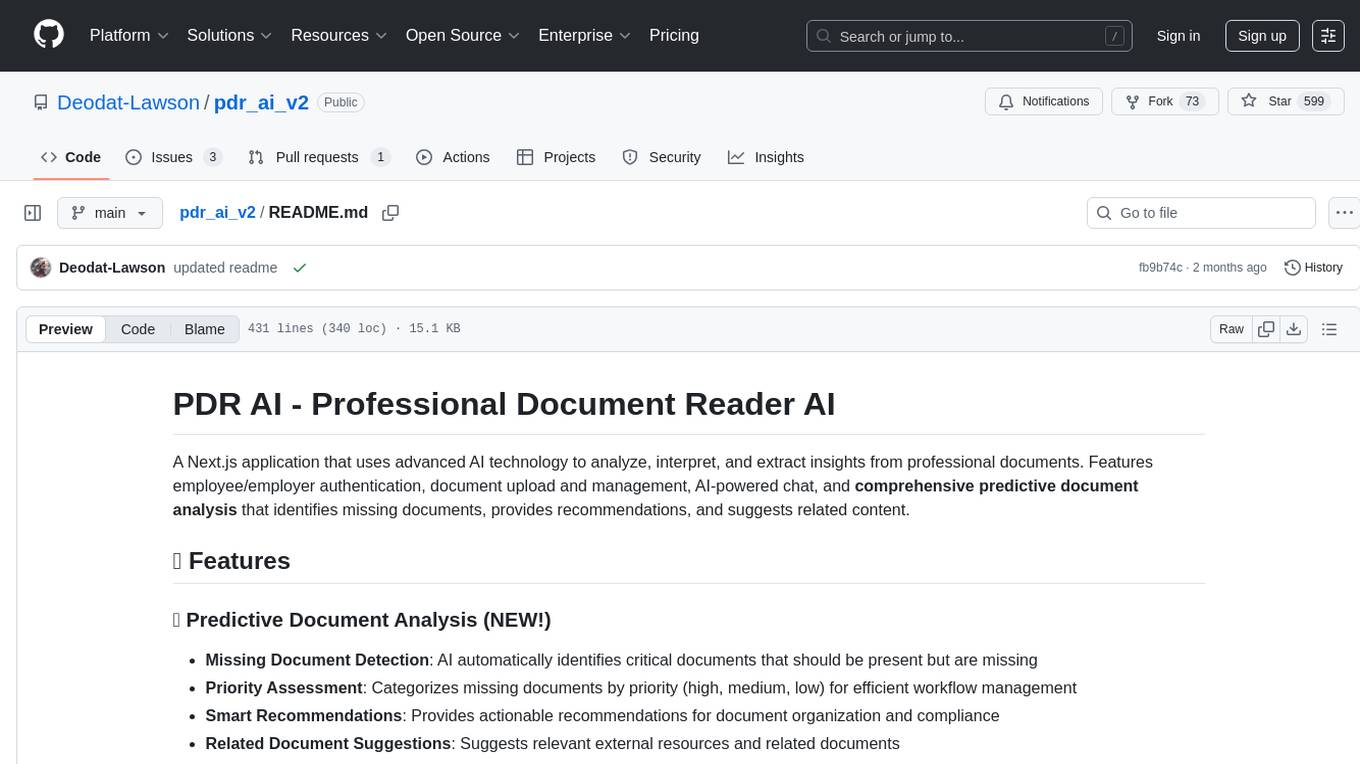
pdr_ai_v2
pdr_ai_v2 is a Python library for implementing machine learning algorithms and models. It provides a wide range of tools and functionalities for data preprocessing, model training, evaluation, and deployment. The library is designed to be user-friendly and efficient, making it suitable for both beginners and experienced data scientists. With pdr_ai_v2, users can easily build and deploy machine learning models for various applications, such as classification, regression, clustering, and more.
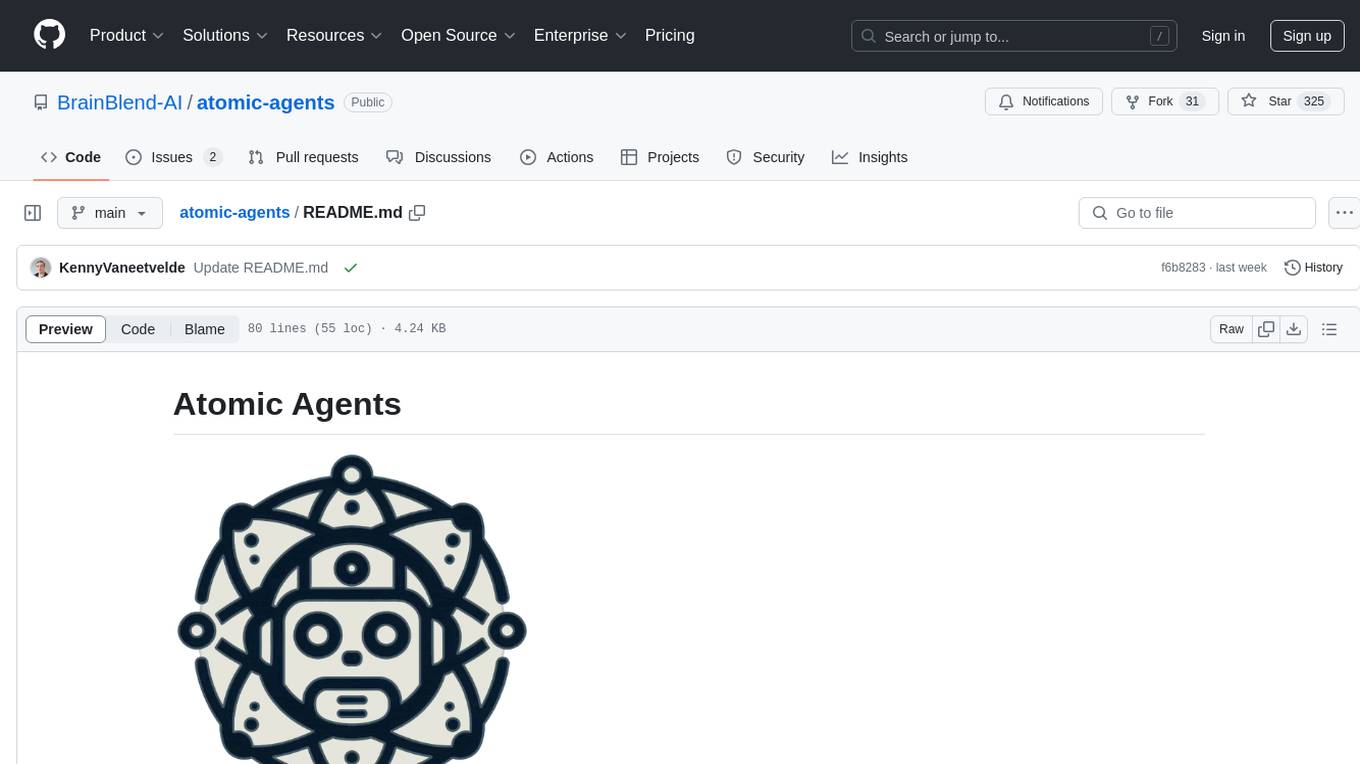
atomic-agents
The Atomic Agents framework is a modular and extensible tool designed for creating powerful applications. It leverages Pydantic for data validation and serialization. The framework follows the principles of Atomic Design, providing small and single-purpose components that can be combined. It integrates with Instructor for AI agent architecture and supports various APIs like Cohere, Anthropic, and Gemini. The tool includes documentation, examples, and testing features to ensure smooth development and usage.
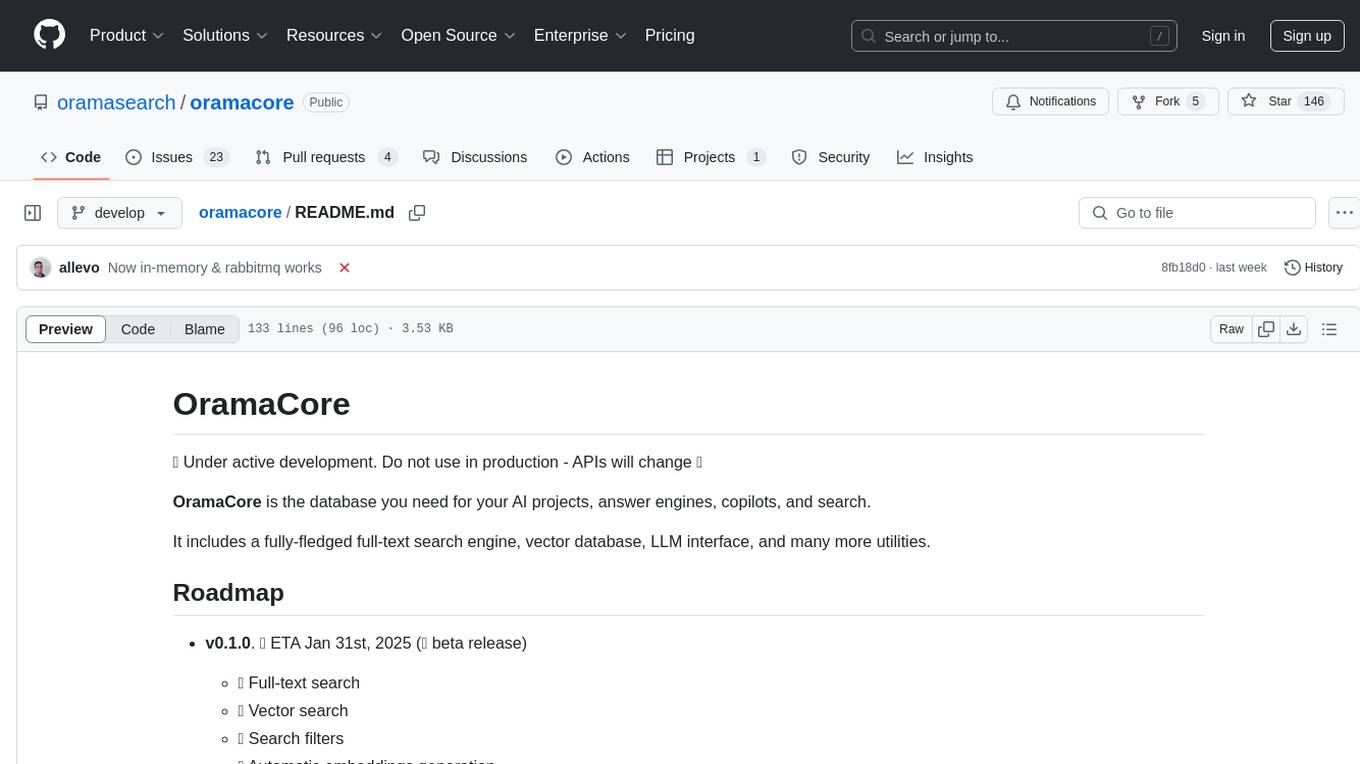
oramacore
OramaCore is a database designed for AI projects, answer engines, copilots, and search functionalities. It offers features such as a full-text search engine, vector database, LLM interface, and various utilities. The tool is currently under active development and not recommended for production use due to potential API changes. OramaCore aims to provide a comprehensive solution for managing data and enabling advanced search capabilities in AI applications.
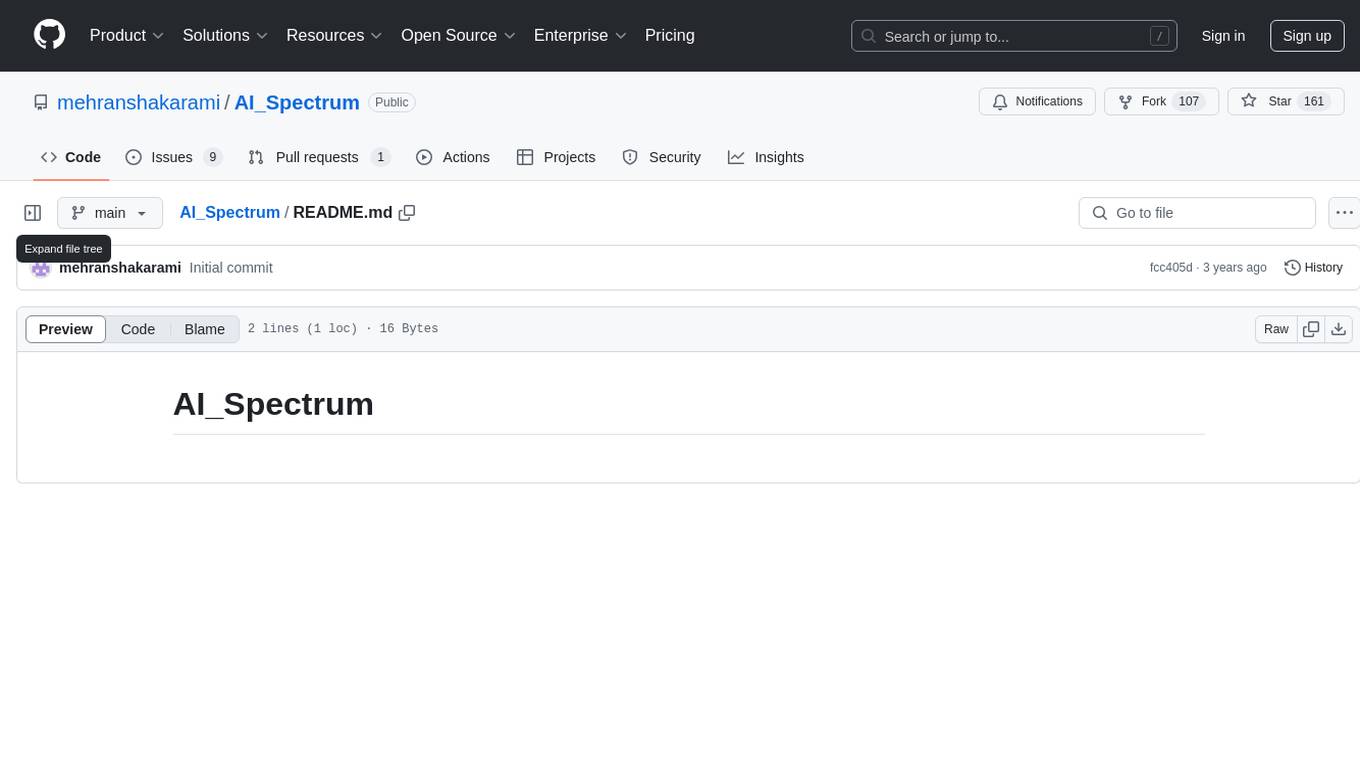
AI_Spectrum
AI_Spectrum is a versatile machine learning library that provides a wide range of tools and algorithms for building and deploying AI models. It offers a user-friendly interface for data preprocessing, model training, and evaluation. With AI_Spectrum, users can easily experiment with different machine learning techniques and optimize their models for various tasks. The library is designed to be flexible and scalable, making it suitable for both beginners and experienced data scientists.
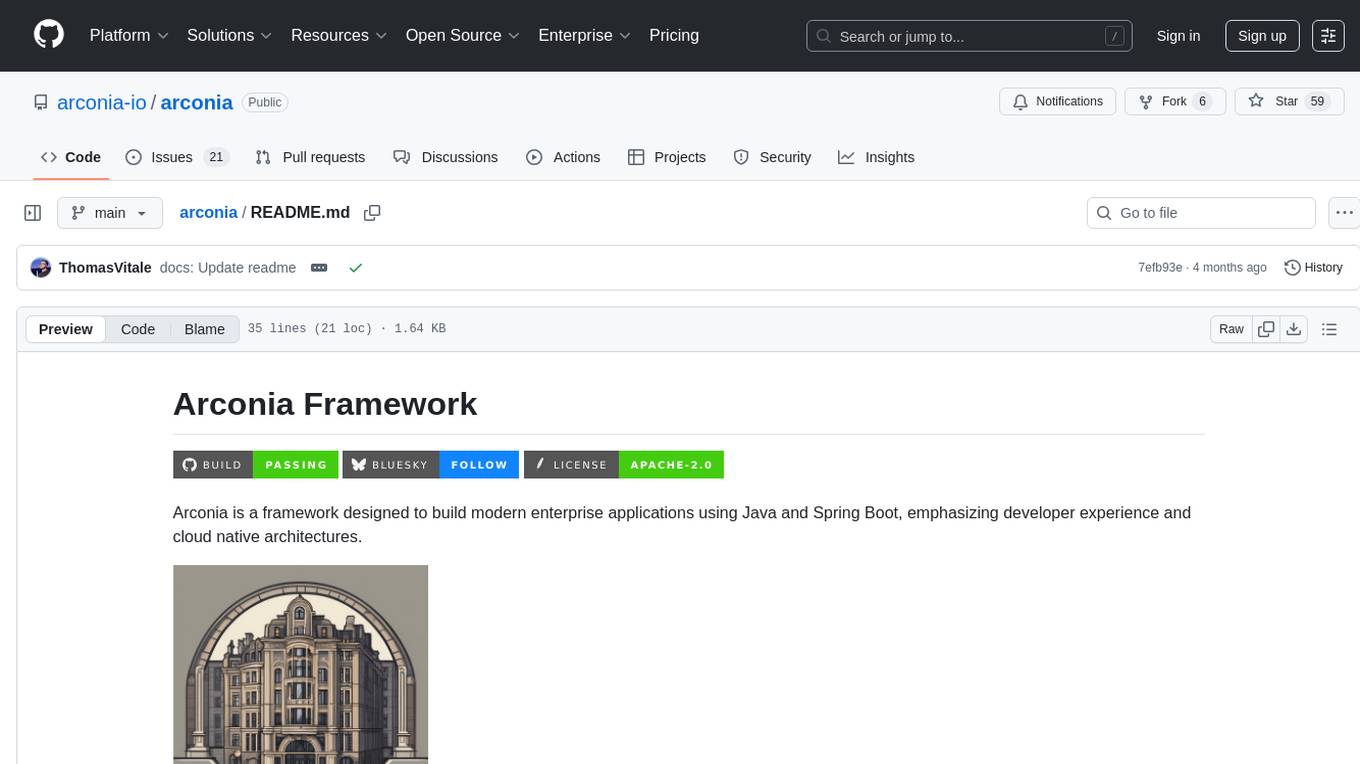
arconia
Arconia is a powerful open-source tool for managing and visualizing data in a user-friendly way. It provides a seamless experience for data analysts and scientists to explore, clean, and analyze datasets efficiently. With its intuitive interface and robust features, Arconia simplifies the process of data manipulation and visualization, making it an essential tool for anyone working with data.
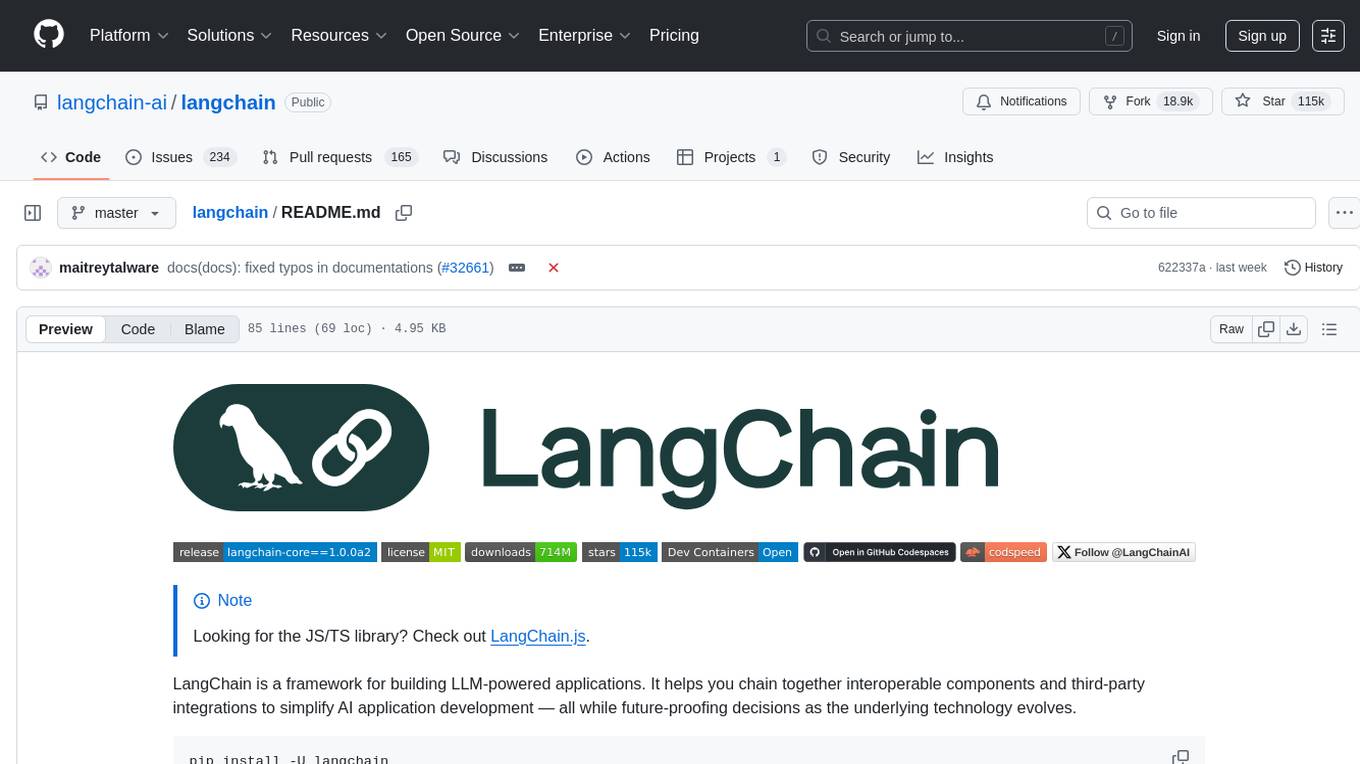
langchain
LangChain is a framework for building LLM-powered applications that simplifies AI application development by chaining together interoperable components and third-party integrations. It helps developers connect LLMs to diverse data sources, swap models easily, and future-proof decisions as technology evolves. LangChain's ecosystem includes tools like LangSmith for agent evals, LangGraph for complex task handling, and LangGraph Platform for deployment and scaling. Additional resources include tutorials, how-to guides, conceptual guides, a forum, API reference, and chat support.

deeppowers
Deeppowers is a powerful Python library for deep learning applications. It provides a wide range of tools and utilities to simplify the process of building and training deep neural networks. With Deeppowers, users can easily create complex neural network architectures, perform efficient training and optimization, and deploy models for various tasks. The library is designed to be user-friendly and flexible, making it suitable for both beginners and experienced deep learning practitioners.

lemonai
LemonAI is a versatile machine learning library designed to simplify the process of building and deploying AI models. It provides a wide range of tools and algorithms for data preprocessing, model training, and evaluation. With LemonAI, users can easily experiment with different machine learning techniques and optimize their models for various tasks. The library is well-documented and beginner-friendly, making it suitable for both novice and experienced data scientists. LemonAI aims to streamline the development of AI applications and empower users to create innovative solutions using state-of-the-art machine learning methods.
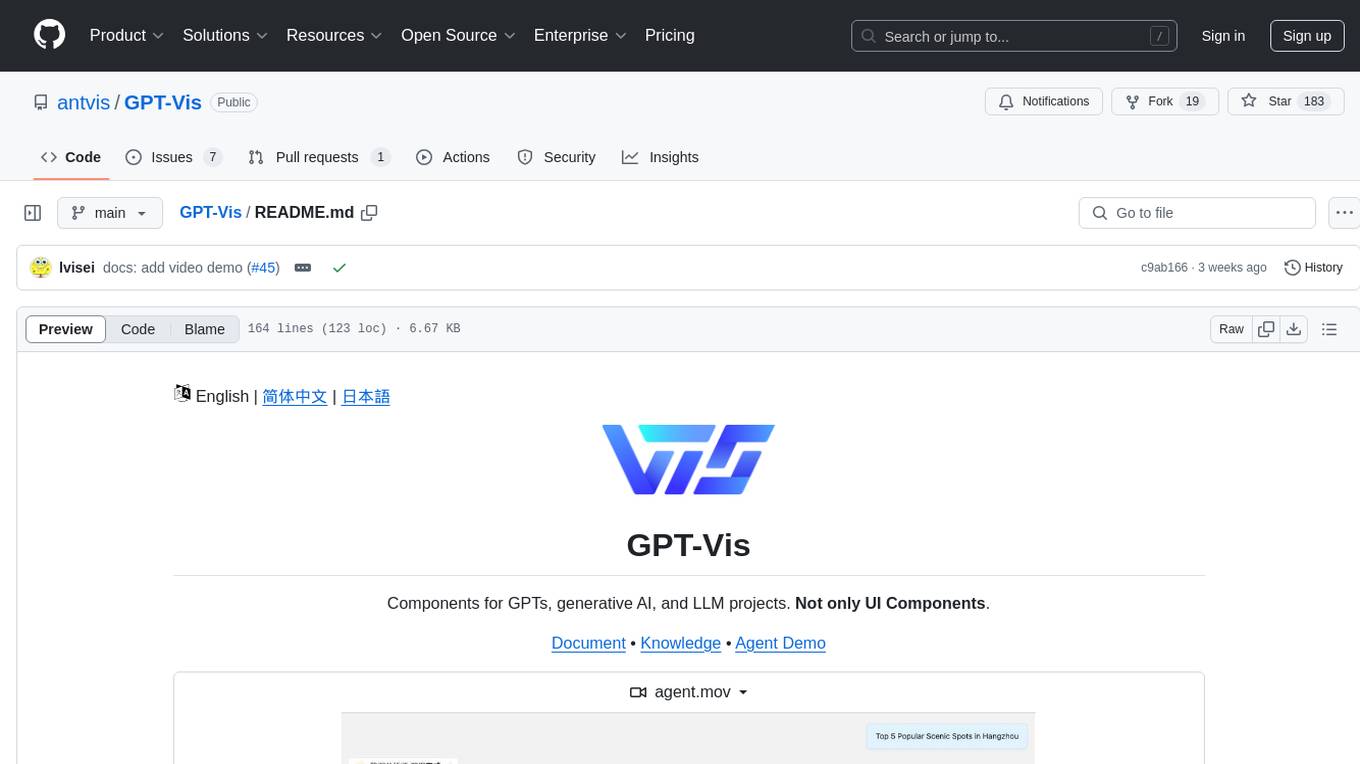
GPT-Vis
GPT-Vis is a tool designed for GPTs, generative AI, and LLM projects. It provides components such as LLM Protocol for conversational interaction, LLM Component for application development, and LLM access for knowledge base and model solutions. The tool aims to facilitate rapid integration into AI applications by offering a visual protocol, built-in components, and chart recommendations for LLM.
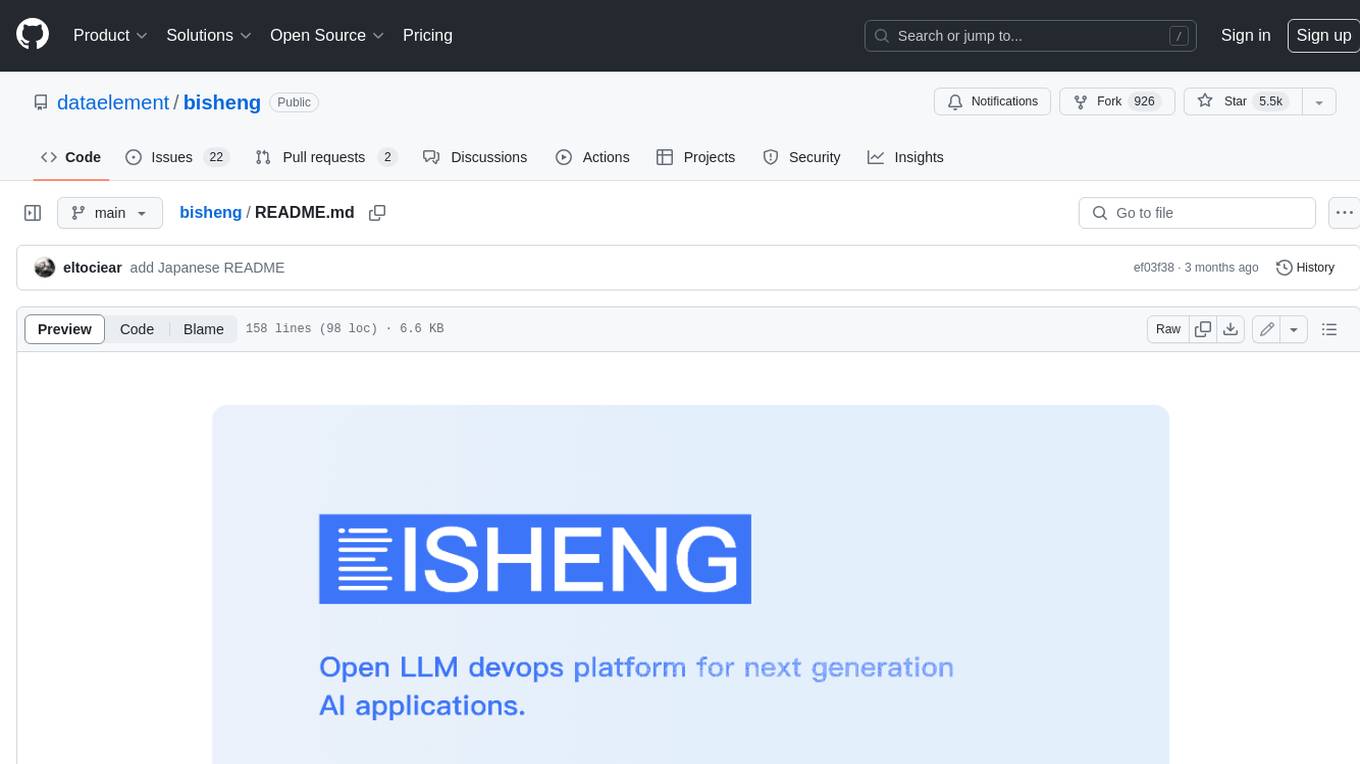
bisheng
Bisheng is a leading open-source **large model application development platform** that empowers and accelerates the development and deployment of large model applications, helping users enter the next generation of application development with the best possible experience.
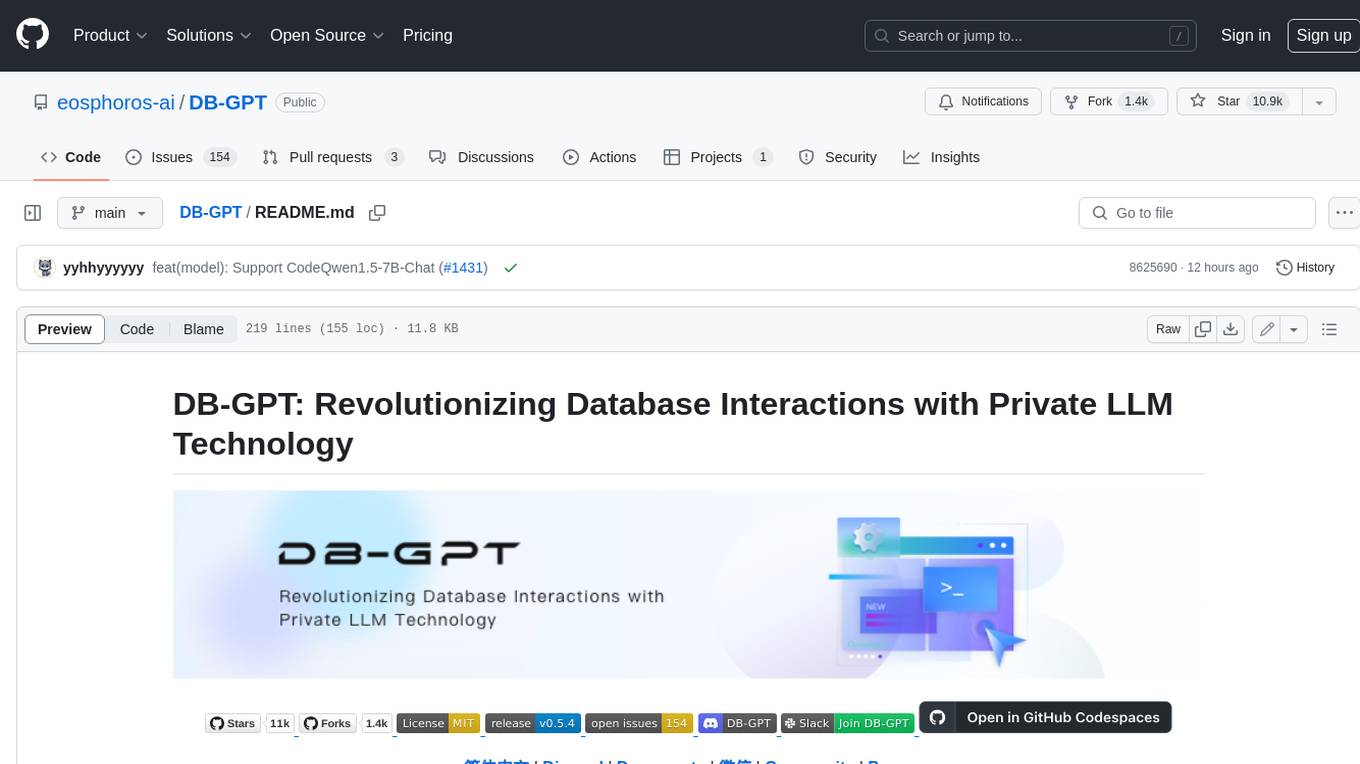
DB-GPT
DB-GPT is an open source AI native data app development framework with AWEL(Agentic Workflow Expression Language) and agents. It aims to build infrastructure in the field of large models, through the development of multiple technical capabilities such as multi-model management (SMMF), Text2SQL effect optimization, RAG framework and optimization, Multi-Agents framework collaboration, AWEL (agent workflow orchestration), etc. Which makes large model applications with data simpler and more convenient.
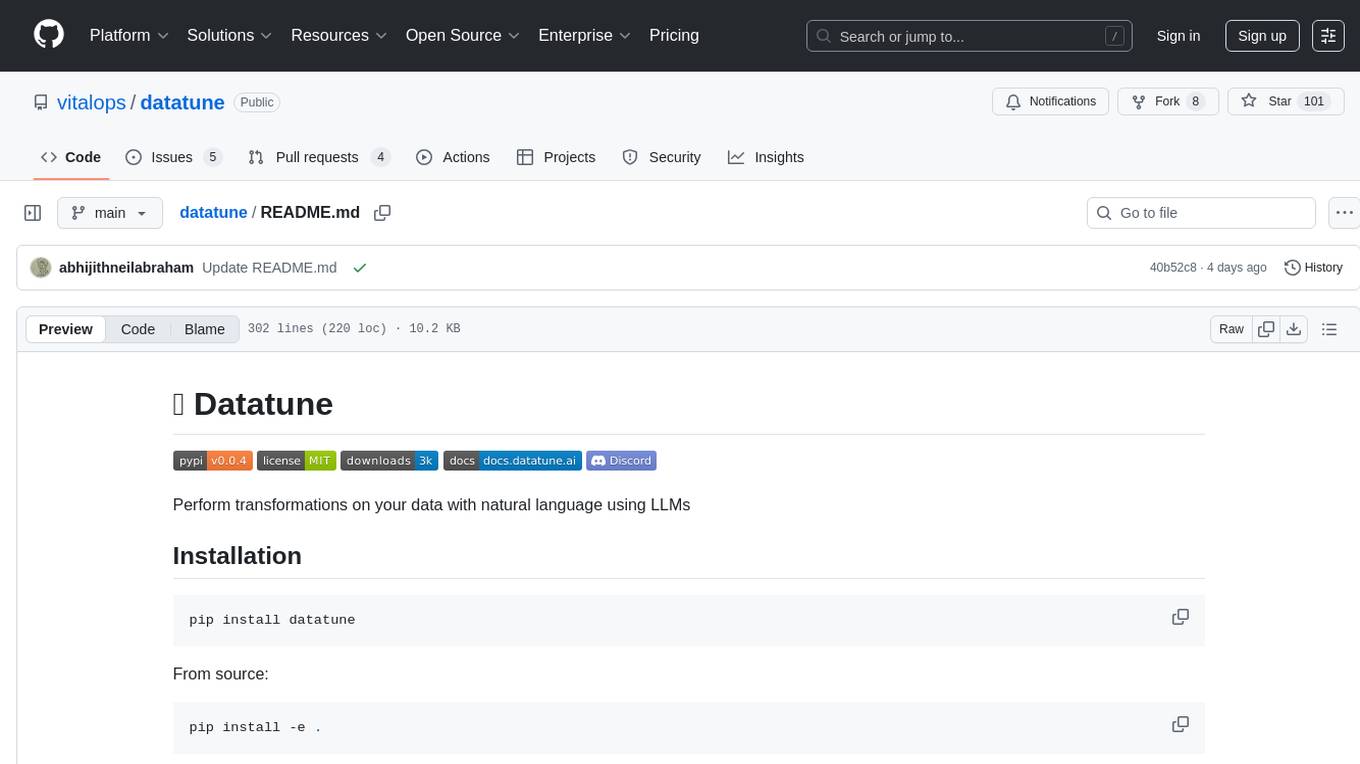
datatune
Datatune is a data analysis tool designed to help users explore and analyze datasets efficiently. It provides a user-friendly interface for importing, cleaning, visualizing, and modeling data. With Datatune, users can easily perform tasks such as data preprocessing, feature engineering, model selection, and evaluation. The tool offers a variety of statistical and machine learning algorithms to support data analysis tasks. Whether you are a data scientist, analyst, or researcher, Datatune can streamline your data analysis workflow and help you derive valuable insights from your data.
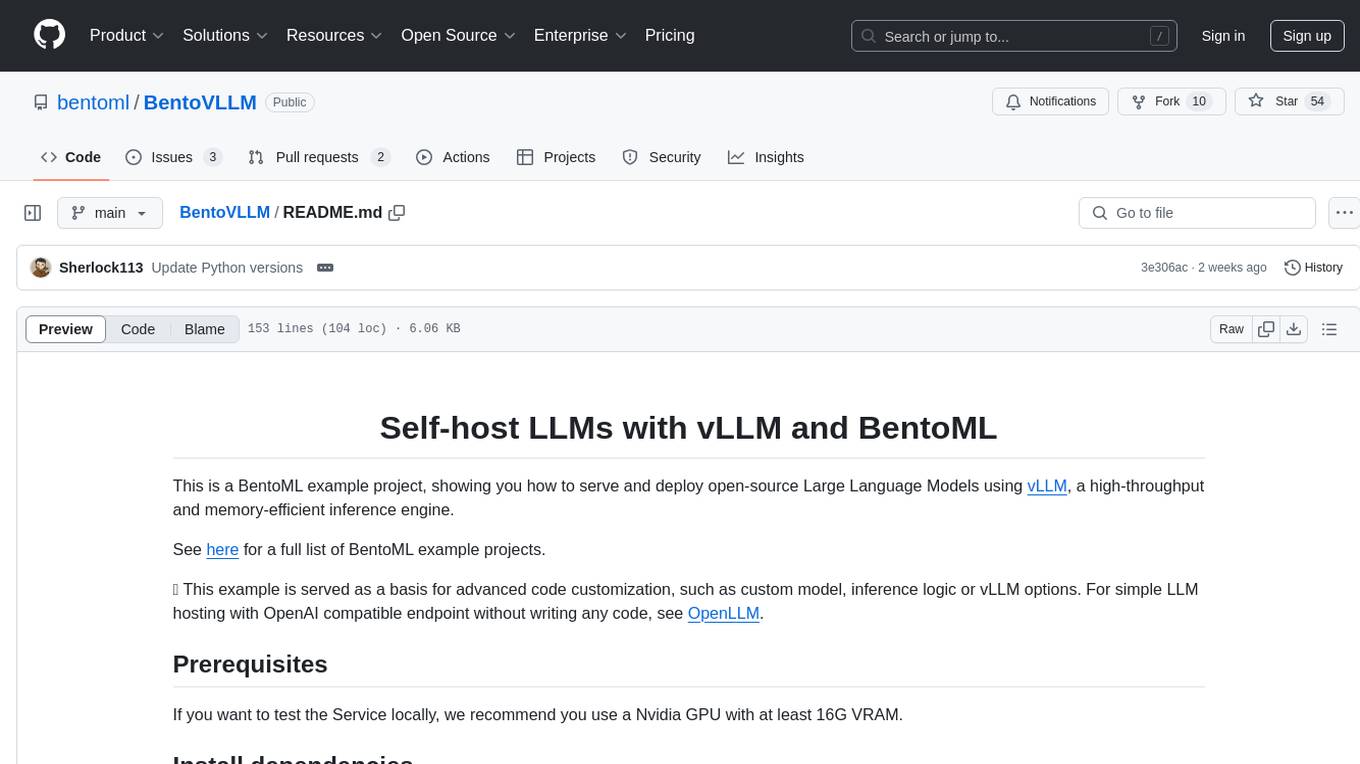
BentoVLLM
BentoVLLM is an example project demonstrating how to serve and deploy open-source Large Language Models using vLLM, a high-throughput and memory-efficient inference engine. It provides a basis for advanced code customization, such as custom models, inference logic, or vLLM options. The project allows for simple LLM hosting with OpenAI compatible endpoints without the need to write any code. Users can interact with the server using Swagger UI or other methods, and the service can be deployed to BentoCloud for better management and scalability. Additionally, the repository includes integration examples for different LLM models and tools.
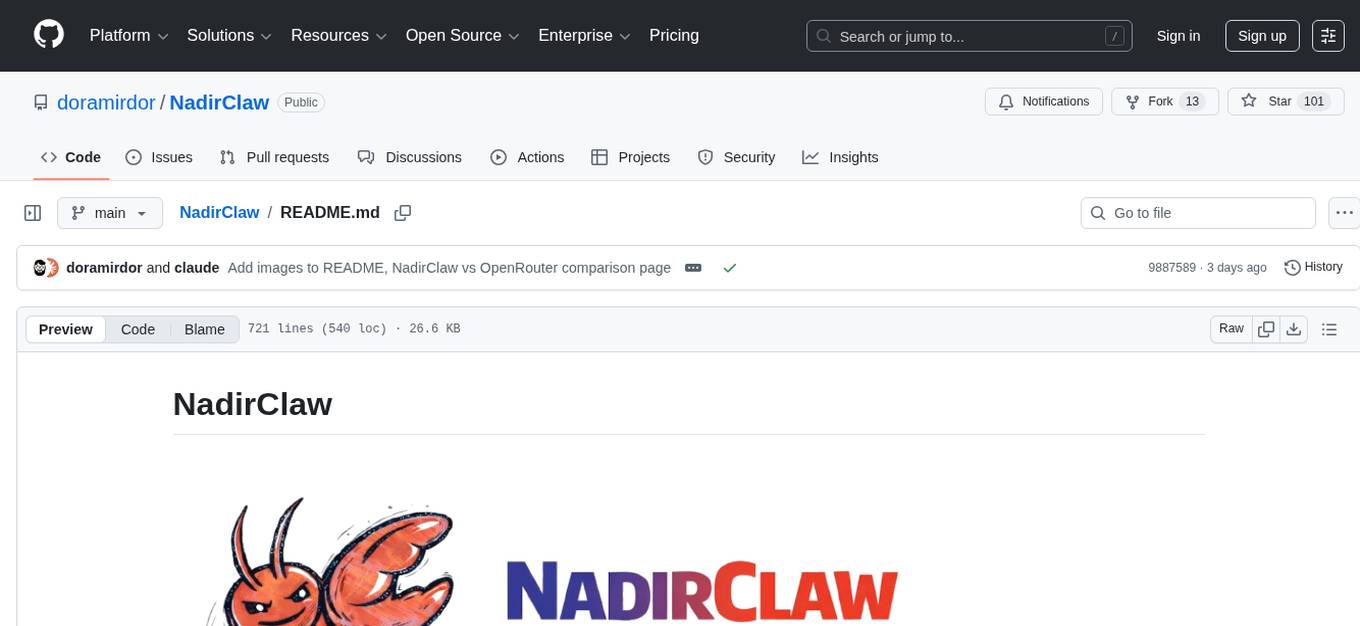
NadirClaw
NadirClaw is a powerful open-source tool designed for web scraping and data extraction. It provides a user-friendly interface for extracting data from websites with ease. With NadirClaw, users can easily scrape text, images, and other content from web pages for various purposes such as data analysis, research, and automation. The tool offers flexibility and customization options to cater to different scraping needs, making it a versatile solution for extracting data from the web. Whether you are a data scientist, researcher, or developer, NadirClaw can streamline your data extraction process and help you gather valuable insights from online sources.
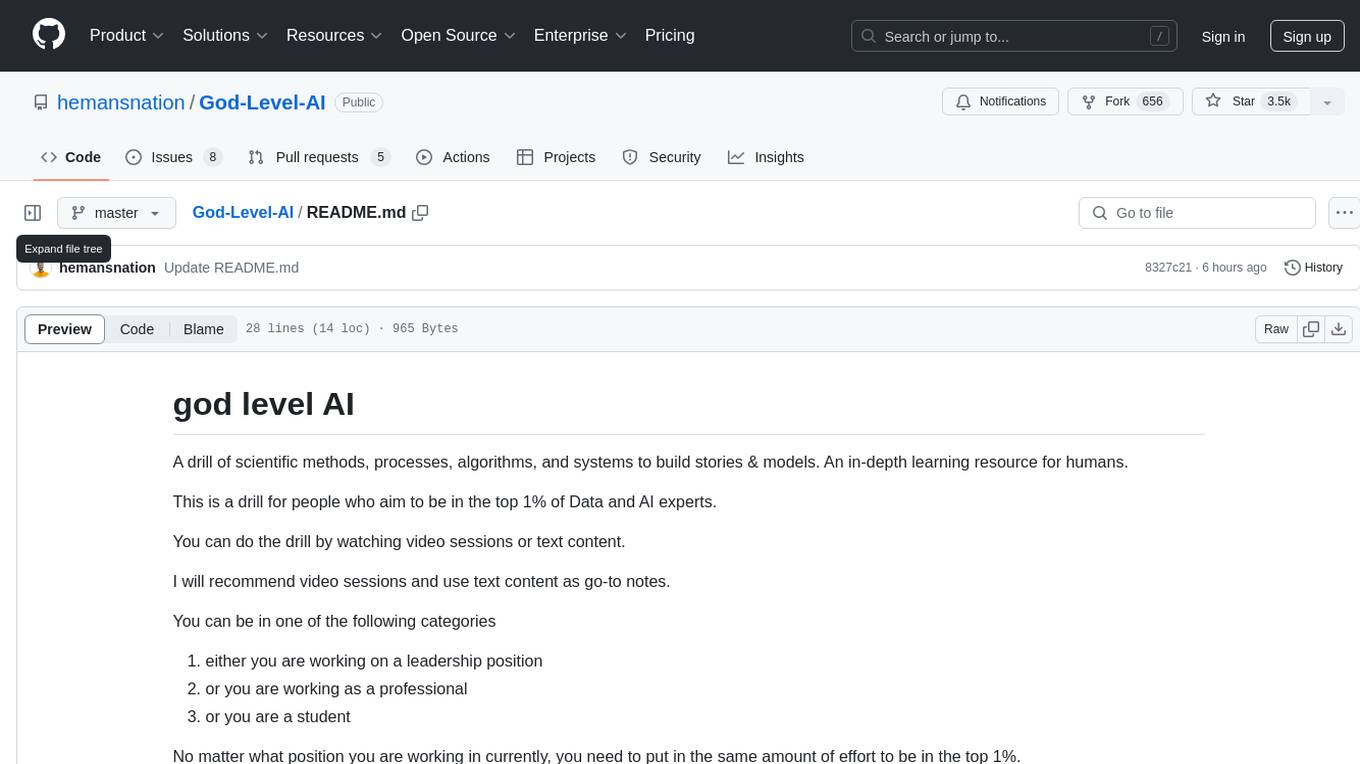
God-Level-AI
A drill of scientific methods, processes, algorithms, and systems to build stories & models. An in-depth learning resource for humans. This repository is designed for individuals aiming to excel in the field of Data and AI, providing video sessions and text content for learning. It caters to those in leadership positions, professionals, and students, emphasizing the need for dedicated effort to achieve excellence in the tech field. The content covers various topics with a focus on practical application.
For similar tasks

llama_index
LlamaIndex is a data framework for building LLM applications. It provides tools for ingesting, structuring, and querying data, as well as integrating with LLMs and other tools. LlamaIndex is designed to be easy to use for both beginner and advanced users, and it provides a comprehensive set of features for building LLM applications.
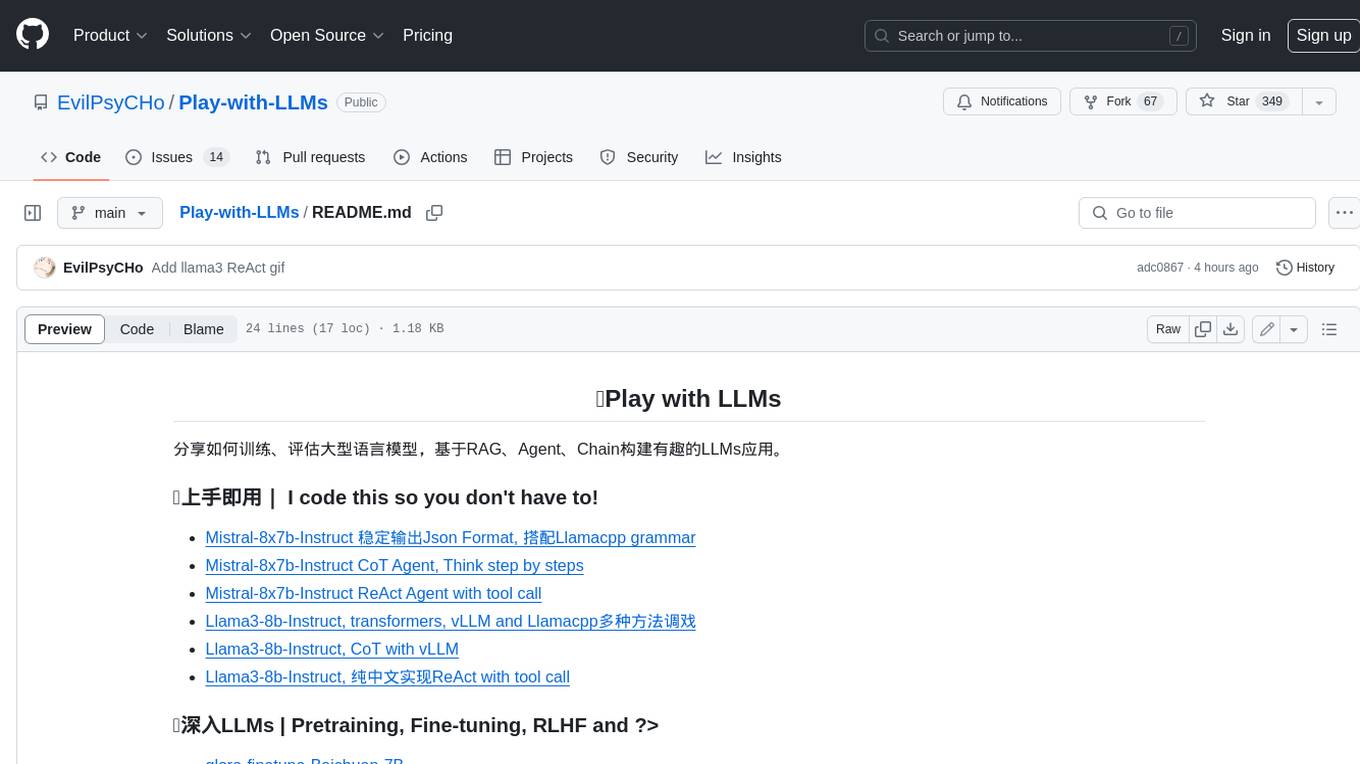
Play-with-LLMs
This repository provides a comprehensive guide to training, evaluating, and building applications with Large Language Models (LLMs). It covers various aspects of LLMs, including pretraining, fine-tuning, reinforcement learning from human feedback (RLHF), and more. The repository also includes practical examples and code snippets to help users get started with LLMs quickly and easily.
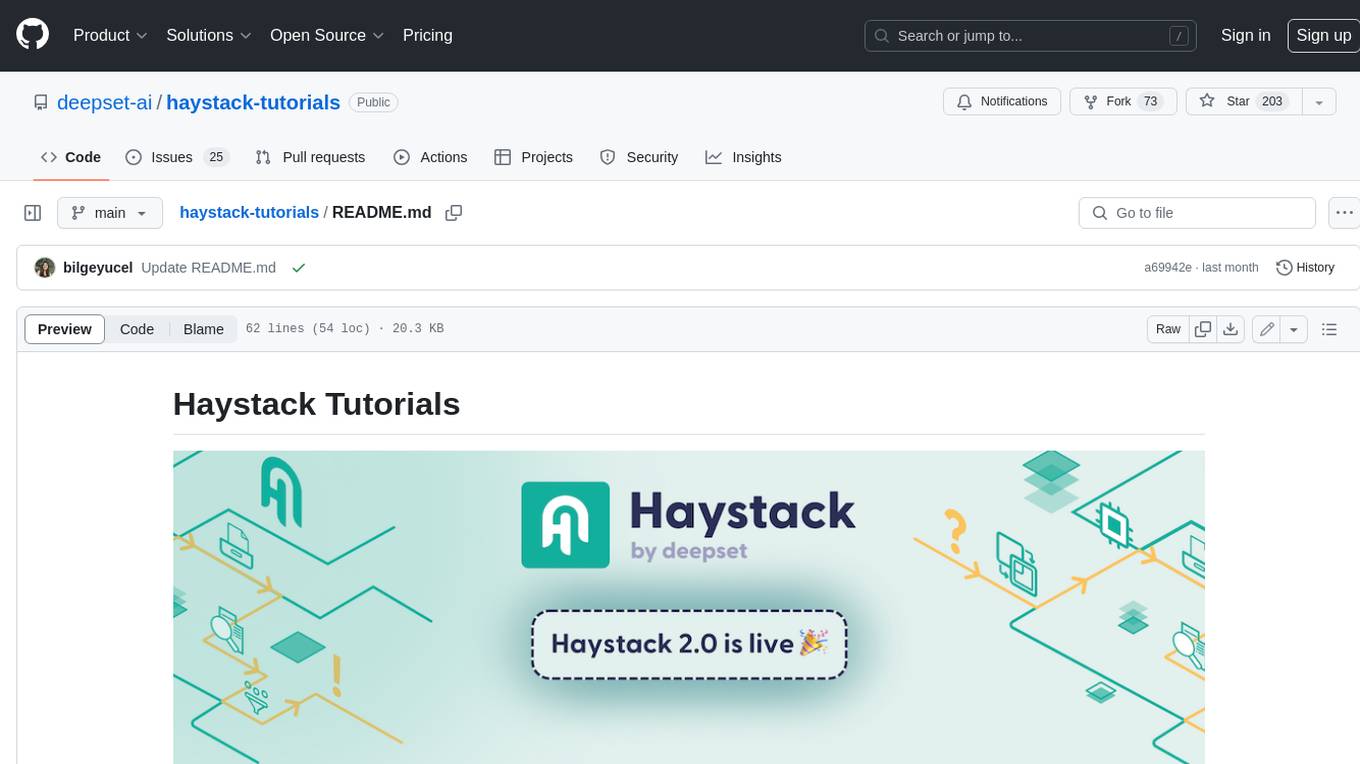
haystack-tutorials
Haystack is an open-source framework for building production-ready LLM applications, retrieval-augmented generative pipelines, and state-of-the-art search systems that work intelligently over large document collections. It lets you quickly try out the latest models in natural language processing (NLP) while being flexible and easy to use.
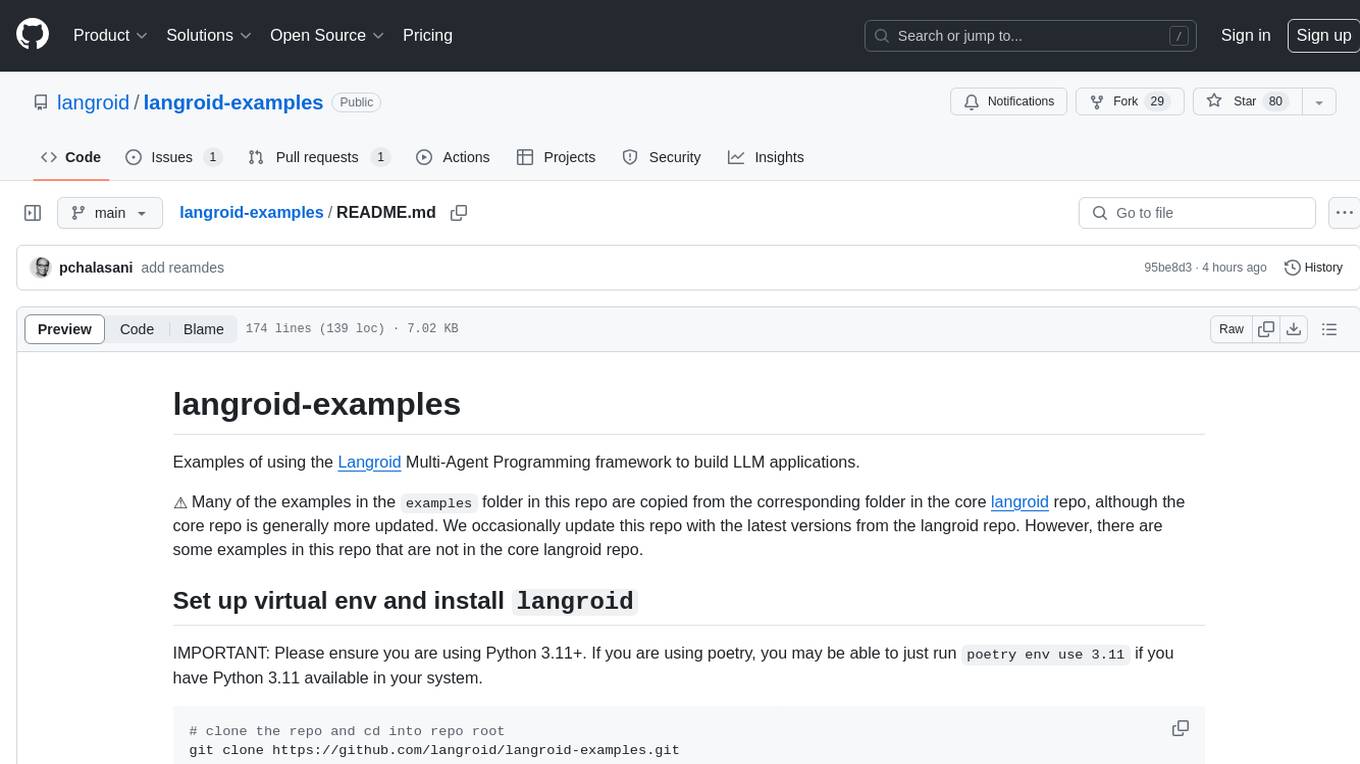
langroid-examples
Langroid-examples is a repository containing examples of using the Langroid Multi-Agent Programming framework to build LLM applications. It provides a collection of scripts and instructions for setting up the environment, working with local LLMs, using OpenAI LLMs, and running various examples. The repository also includes optional setup instructions for integrating with Qdrant, Redis, Momento, GitHub, and Google Custom Search API. Users can explore different scenarios and functionalities of Langroid through the provided examples and documentation.
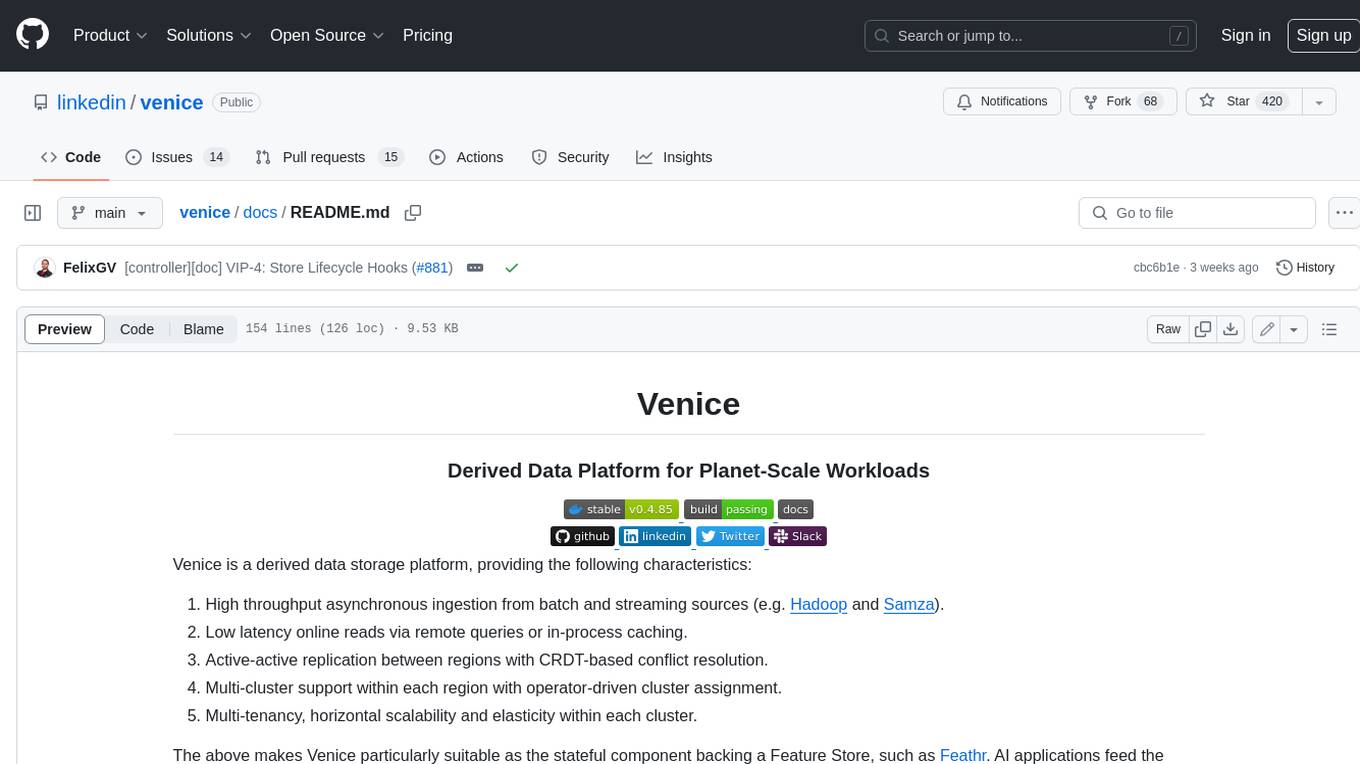
venice
Venice is a derived data storage platform, providing the following characteristics: 1. High throughput asynchronous ingestion from batch and streaming sources (e.g. Hadoop and Samza). 2. Low latency online reads via remote queries or in-process caching. 3. Active-active replication between regions with CRDT-based conflict resolution. 4. Multi-cluster support within each region with operator-driven cluster assignment. 5. Multi-tenancy, horizontal scalability and elasticity within each cluster. The above makes Venice particularly suitable as the stateful component backing a Feature Store, such as Feathr. AI applications feed the output of their ML training jobs into Venice and then query the data for use during online inference workloads.
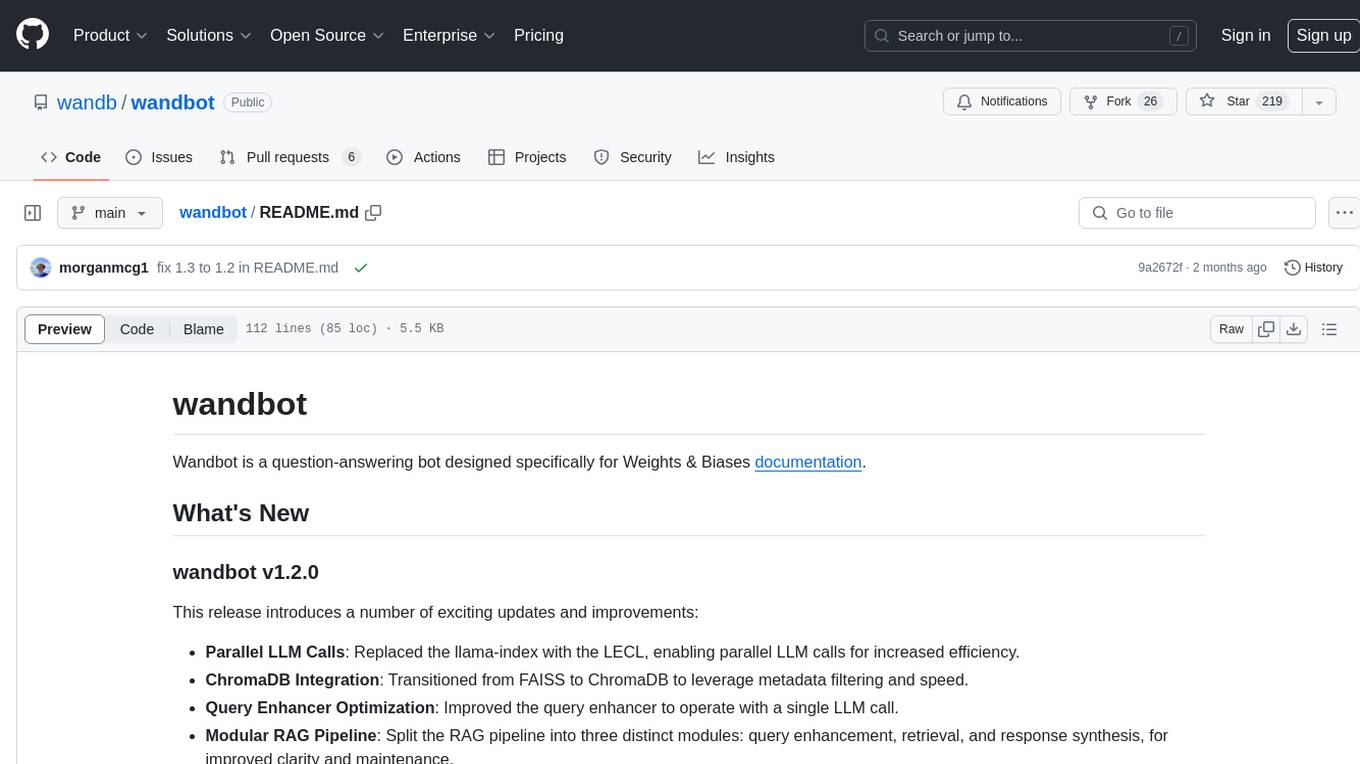
wandbot
Wandbot is a question-answering bot designed for Weights & Biases documentation. It employs Retrieval Augmented Generation with a ChromaDB backend for efficient responses. The bot features periodic data ingestion, integration with Discord and Slack, and performance monitoring through logging. It has a fallback mechanism for model selection and is evaluated based on retrieval accuracy and model-generated responses. The implementation includes creating document embeddings, constructing the Q&A RAGPipeline, model selection, deployment on FastAPI, Discord, and Slack, logging and analysis with Weights & Biases Tables, and performance evaluation.
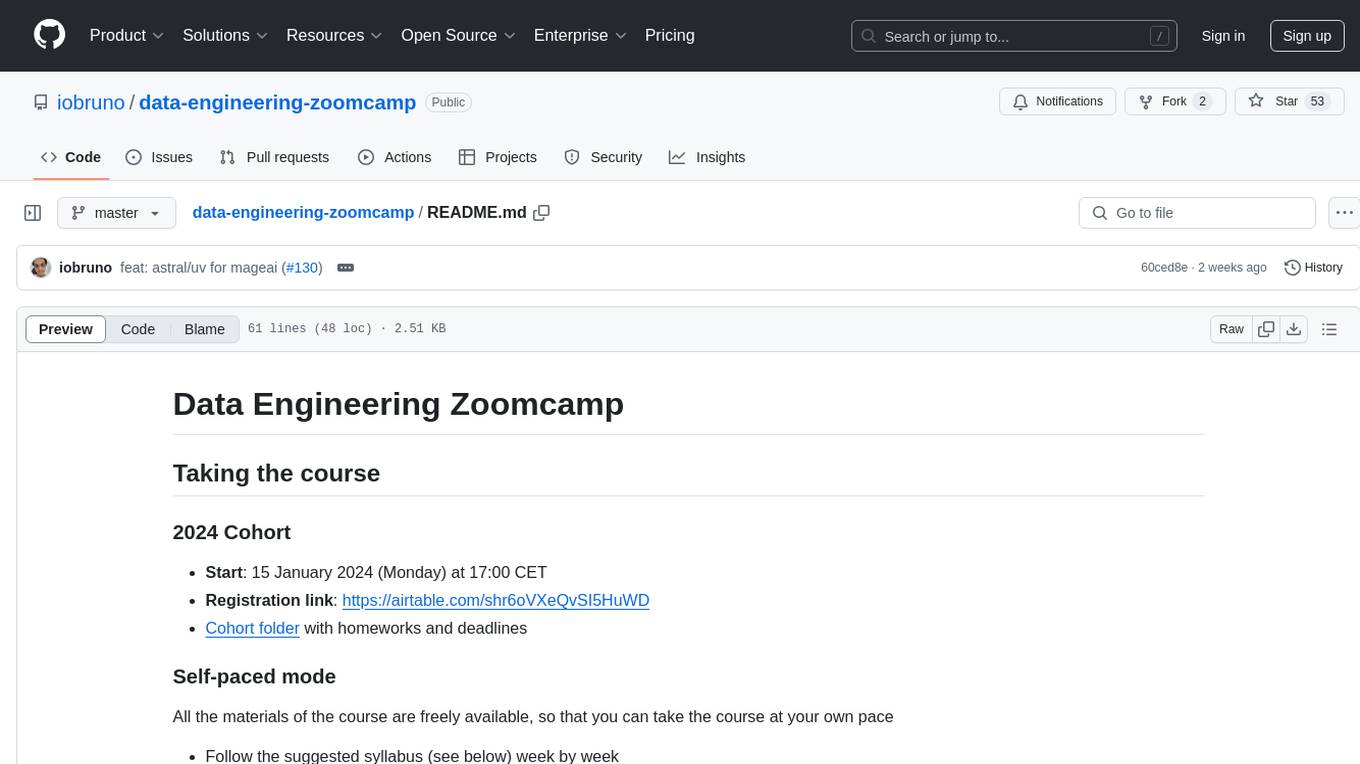
data-engineering-zoomcamp
Data Engineering Zoomcamp is a comprehensive course covering various aspects of data engineering, including data ingestion, workflow orchestration, data warehouse, analytics engineering, batch processing, and stream processing. The course provides hands-on experience with tools like Python, Rust, Terraform, Airflow, BigQuery, dbt, PySpark, Kafka, and more. Students will learn how to work with different data technologies to build scalable and efficient data pipelines for analytics and processing. The course is designed for individuals looking to enhance their data engineering skills and gain practical experience in working with big data technologies.
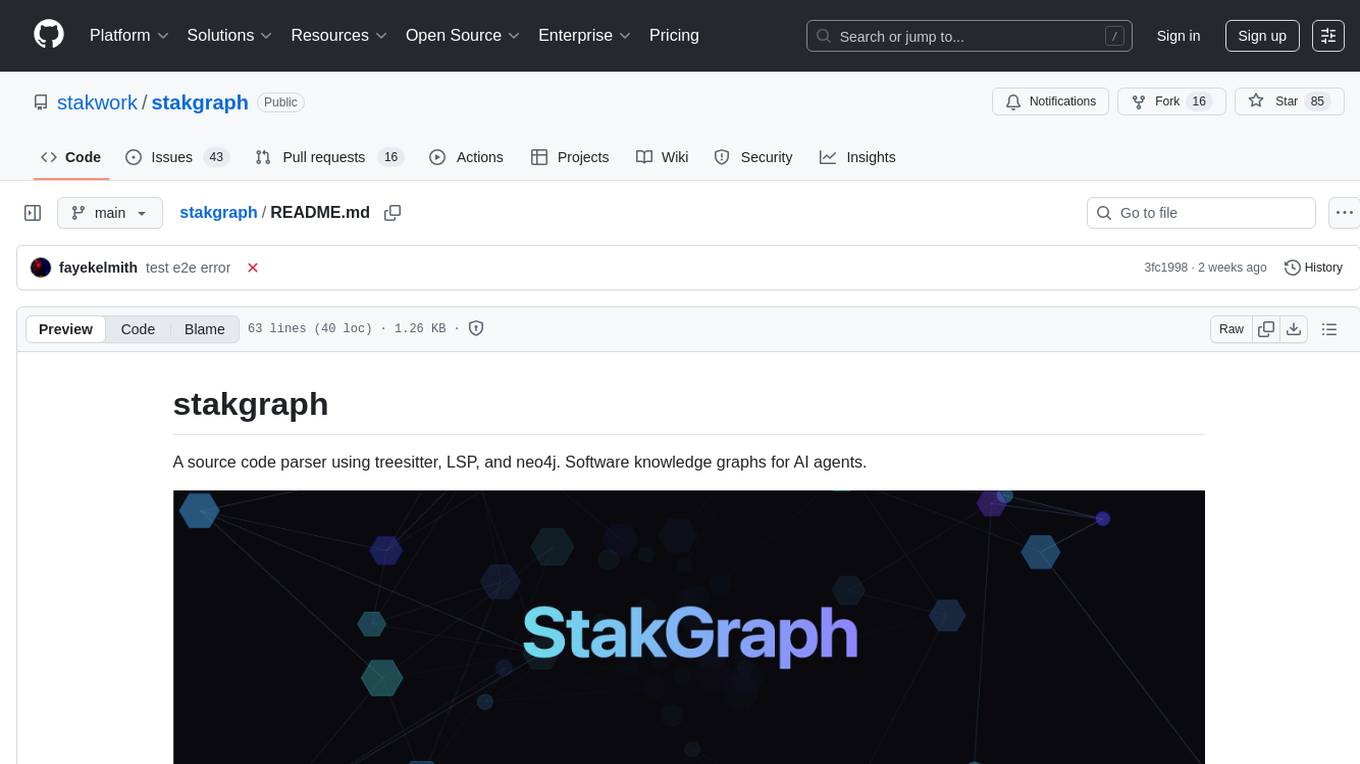
stakgraph
Stakgraph is a source code parser that utilizes treesitter, LSP, and neo4j to create software knowledge graphs for AI agents. It supports various languages such as Golang, React, Ruby on Rails, Typescript, Python, Swift, Kotlin, Rust, Java, Angular, and Svelte. Users can parse repositories, link endpoints, requests, and E2E tests, and ingest data to generate comprehensive graphs. The tool leverages the Language Server Protocol for node connections in the graph, enabling seamless integration and analysis of codebases.
For similar jobs
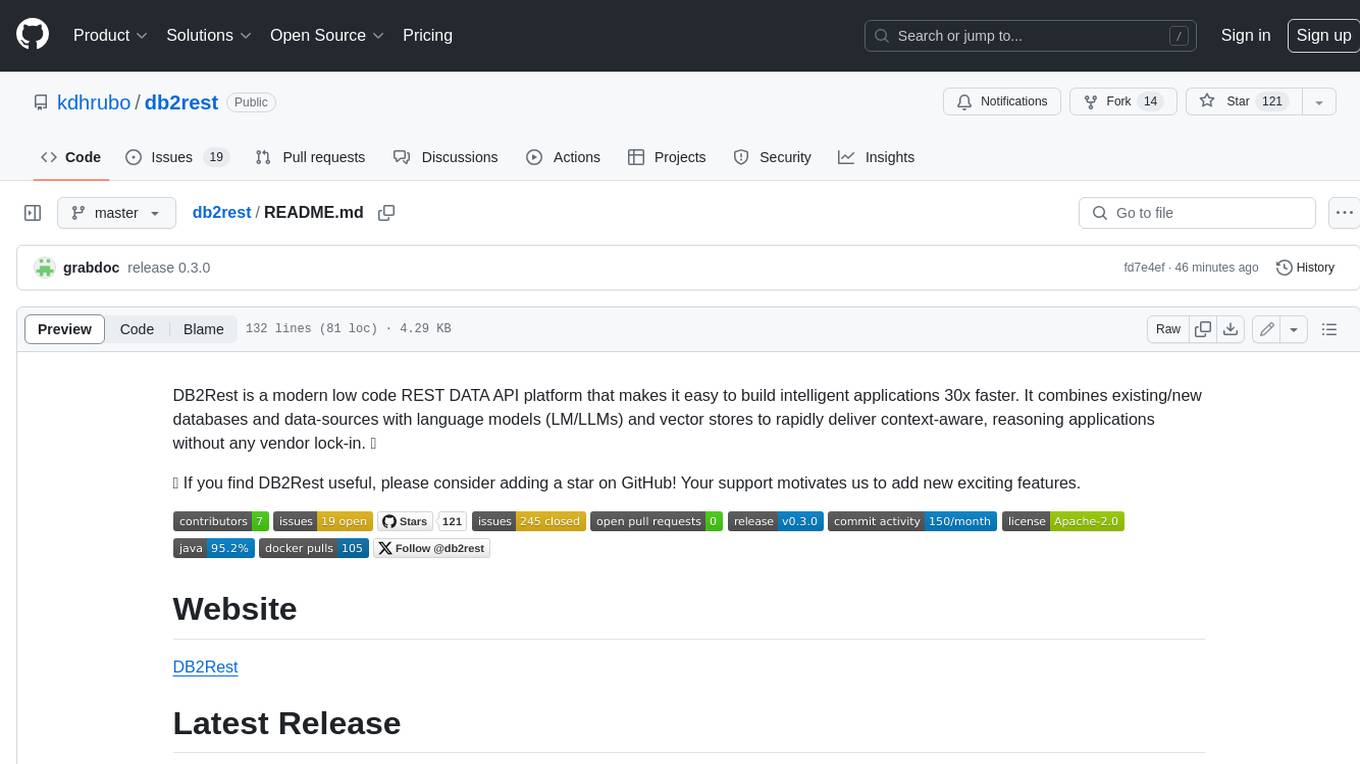
db2rest
DB2Rest is a modern low-code REST DATA API platform that simplifies the development of intelligent applications. It seamlessly integrates existing and new databases with language models (LMs/LLMs) and vector stores, enabling the rapid delivery of context-aware, reasoning applications without vendor lock-in.

mage-ai
Mage is an open-source data pipeline tool for transforming and integrating data. It offers an easy developer experience, engineering best practices built-in, and data as a first-class citizen. Mage makes it easy to build, preview, and launch data pipelines, and provides observability and scaling capabilities. It supports data integrations, streaming pipelines, and dbt integration.

airbyte
Airbyte is an open-source data integration platform that makes it easy to move data from any source to any destination. With Airbyte, you can build and manage data pipelines without writing any code. Airbyte provides a library of pre-built connectors that make it easy to connect to popular data sources and destinations. You can also create your own connectors using Airbyte's no-code Connector Builder or low-code CDK. Airbyte is used by data engineers and analysts at companies of all sizes to build and manage their data pipelines.

labelbox-python
Labelbox is a data-centric AI platform for enterprises to develop, optimize, and use AI to solve problems and power new products and services. Enterprises use Labelbox to curate data, generate high-quality human feedback data for computer vision and LLMs, evaluate model performance, and automate tasks by combining AI and human-centric workflows. The academic & research community uses Labelbox for cutting-edge AI research.

telemetry-airflow
This repository codifies the Airflow cluster that is deployed at workflow.telemetry.mozilla.org (behind SSO) and commonly referred to as "WTMO" or simply "Airflow". Some links relevant to users and developers of WTMO: * The `dags` directory in this repository contains some custom DAG definitions * Many of the DAGs registered with WTMO don't live in this repository, but are instead generated from ETL task definitions in bigquery-etl * The Data SRE team maintains a WTMO Developer Guide (behind SSO)

airflow
Apache Airflow (or simply Airflow) is a platform to programmatically author, schedule, and monitor workflows. When workflows are defined as code, they become more maintainable, versionable, testable, and collaborative. Use Airflow to author workflows as directed acyclic graphs (DAGs) of tasks. The Airflow scheduler executes your tasks on an array of workers while following the specified dependencies. Rich command line utilities make performing complex surgeries on DAGs a snap. The rich user interface makes it easy to visualize pipelines running in production, monitor progress, and troubleshoot issues when needed.
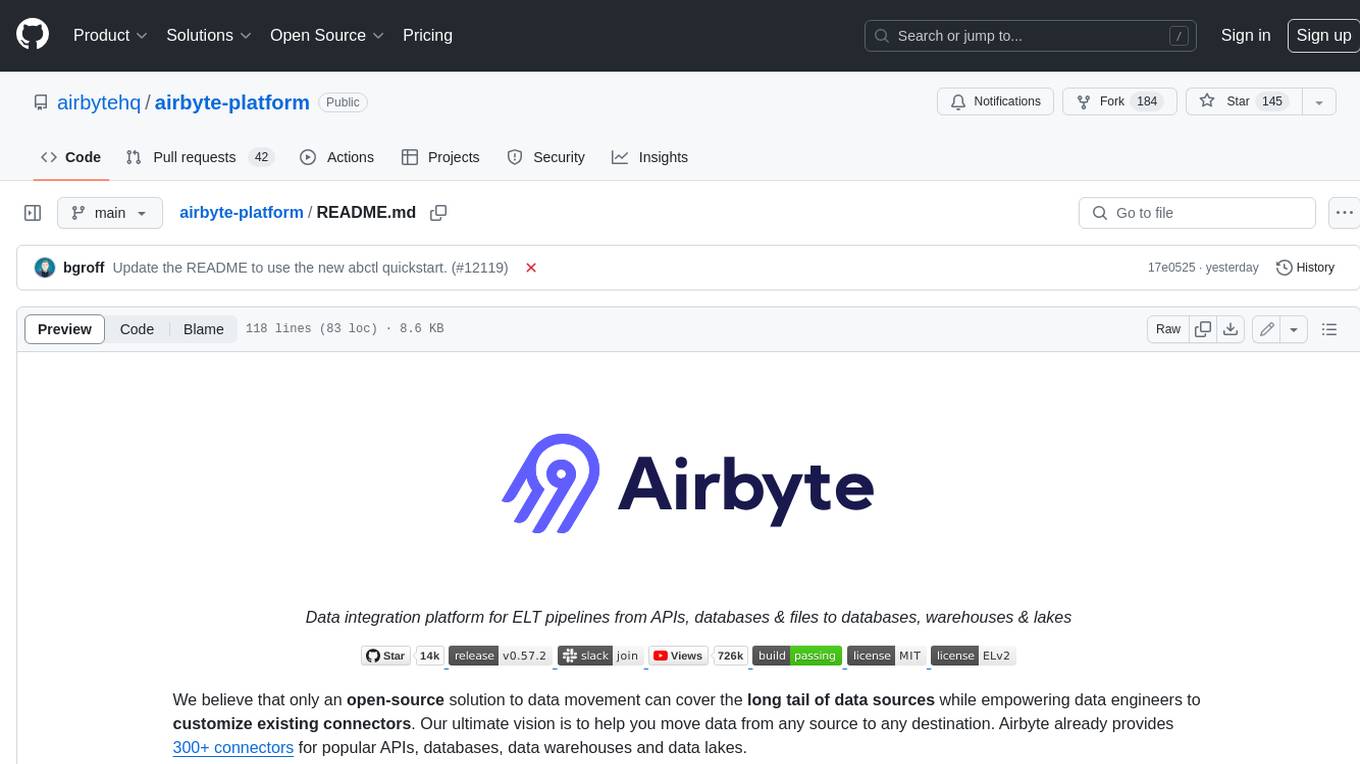
airbyte-platform
Airbyte is an open-source data integration platform that makes it easy to move data from any source to any destination. With Airbyte, you can build and manage data pipelines without writing any code. Airbyte provides a library of pre-built connectors that make it easy to connect to popular data sources and destinations. You can also create your own connectors using Airbyte's low-code Connector Development Kit (CDK). Airbyte is used by data engineers and analysts at companies of all sizes to move data for a variety of purposes, including data warehousing, data analysis, and machine learning.
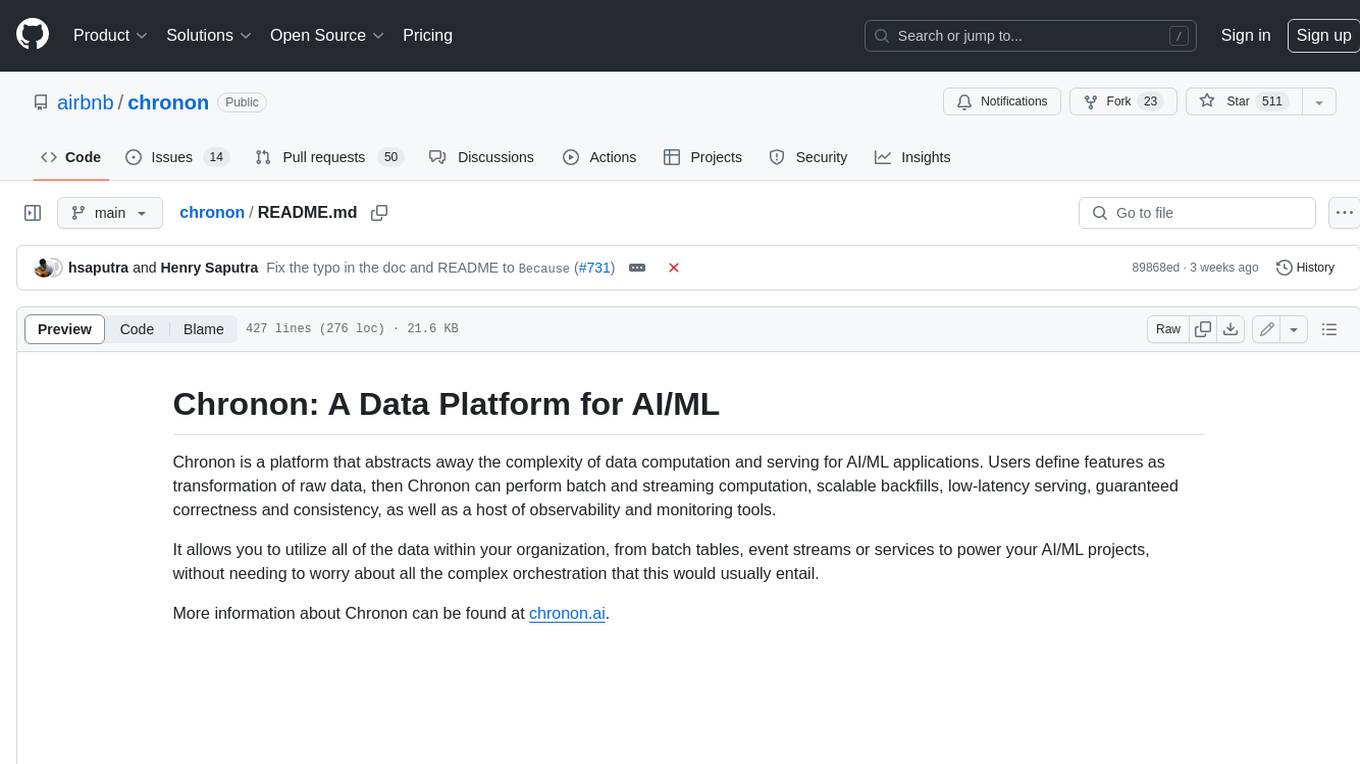
chronon
Chronon is a platform that simplifies and improves ML workflows by providing a central place to define features, ensuring point-in-time correctness for backfills, simplifying orchestration for batch and streaming pipelines, offering easy endpoints for feature fetching, and guaranteeing and measuring consistency. It offers benefits over other approaches by enabling the use of a broad set of data for training, handling large aggregations and other computationally intensive transformations, and abstracting away the infrastructure complexity of data plumbing.





